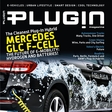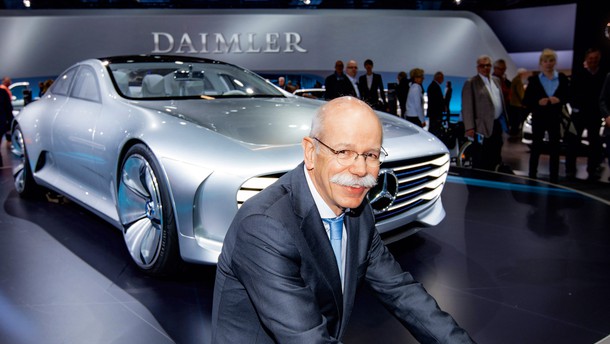

With successive record sales and profits, and a more than likely realization of the promise made in 2005 - to reclaim the leader's throne among the German premium brands globally, Dieter Zetsche has many reasons to smile. Even if Audi and BMW's reactions may turn the last three years of Zetsche's reign at the head of Daimler, which will end in 2019.
Until then, he will do everything in his power so that Mercedes-Benz is perceived as the world's best car, while laying the solid foundation for the ongoing revolution that is autonomous driving: "Time," says Dieter Zetsche, Chairman of Daimler "is the greatest of all luxuries in our lives."
The E-Class, which launched this year, is the last model of the complete refurbishment of the Mercedes-Benz model range, and the company is currently enjoying great success in all parameters: record sales globally, recovery of the leadership among German premium brands, all-time high profits. Is it difficult for you not to feel stunned by the heady sense of accomplishment?
In the past 10 years, my ultimate goal was to position the company in first place within the industry´s core business, and to improve our competitiveness in the areas of greatest interest to the customer. We are very close. But, on the other hand, we are in an era of enormous changes in this industry: emission-free driving, the totally connected car as part of the internet of things, autonomous driving, sharing vs owning vehicles, the digitalization of the entire value chain, from engineering to the interaction with the consumer, etc...all made possible by advanced technology and artificial intelligence. I feel we have been totally committed to being first in this very tough sales competition with our traditional rivals, and now it seems to me that the time has come to expand the focus and have much wider horizons, even with new competitors in our business. I want to set the path for Daimler to be able to succeed in the next 100 years, if we exaggerate a little...
Mercedes-Benz commitment to autonomous driving technologies leads us to think about the future of car brands. What will the values directly associated with the act of driving be, if the car will assume that task itself. Will the brand value not dilute with fully autonomous driving, when it is widespread? Are automakers working hard to fill the roads with appliances on wheels?
I do not think that the automatic transmission has withdrawn the fun element of driving, or that automatic cruise control systems have done anything similar. The fact that the cars are going to become increasingly safe is a concept that appeals to everyone, and we are pursuing the "driving without accidents" vision for some time, and now we are taking huge steps towards its realization. It will always be a user option, to engage the autonomous driving system that, as today, will not prevent the human driver from driving, really. The idea is that, in very concrete situations, or when actually the driver needs to do other activities during the trip (while alone in the car), he is given the possibility to delegate driving. When we unveiled the F015 concept, we said that time is the ultimate luxury, and space also plays a big role. When, in a particularly dense traffic situation, the driver prefers, in his own space, to listen to music, watch a movie, make a video call or whatever it is, he will have that possibility. He is not forced to keep hanging onto the steering wheel in a sacrificial mission (either because it rains copiously or because bottling stop-start traffic will take the next 3 hours of his life) and, instead, he is allowed to use this time in a more useful and/or more pleasant way, commuting exactly from point A to point B. In the world of sailing, for example, there are some yacht owners who almost kill themselves when dealin with navigating with their own hands (when they choose to do so), with enormous physical effort. Others prefer to have a crew that deals with the subject, and prefer to enjoy the sun, relaxing. These are two luxury experiences, particularly in the second case, even if the owner of the boat is not taming the waves himself.
So you do not agree with the view that autonomously driven vehicles threaten to be so successful that the charm of having a car will eventually be replaced by the charm of being "chauffeured" to locations?
I think that if a technology adds value to the user's life to an extent that he prefers the new offer, it would be quite stupid for us manufacturers to try to fight this trend. It makes much more sense to seize this opportunity and lead this transformation process. And that's what we are doing. On the other hand, owning will give away some market quota to sharing...

"I was the only one in this debate with my colleagues at Audi and BMW who had a deep knowledge of the problem."
It is not hard to guess that finding the responsibility for a car crash will be a very sensitive issue in the autonomous driving future. On the other hand, the question of access to vehicle data also raises serious concerns among consumers. What are your views on those two complicated subjects?
I do not expect that the legislator will want to delay every technical development we are working on, and I see it more as a two-sided learning process: there will be situations where the legislator will want to block technological developments that would benefit the customer, trying to protect him from irresponsible situations. By the time the car is fully autonomous and the driver is given the choice to sit in the rear seat, then the situation will definitely have changed. From that moment on, if there is an accident, the liability will be, most likely, on the manufacturer´s side, and that will push us to work very, very hard until we get there. But we will not put any autonomous cars on roads that are not duly prepared.
Focusing now on electric mobility per se, Mercedes-Benz joined forces in the recent past with direct rivals in several projects (such as the acquisition of Nokia Here wireless battery charging, in both cases alongside BMW and Audi), but recently you seemed less interested in partnering with them, in a hypothetical joint-venture that would create a sort of German Batteries Inc. Would a project of this nature not solve the high cost issues that affected the manufacturing activities of your Li-Tec company, which closed its doors at the end of 2015?
I think I can safely say that I was the only one in this debate with my colleagues at Audi and BMW who had a deep knowledge of the problem, because we at Mercedes-Benz are the only ones who have our own cell production, and that already represents a surplus, in relation to what the market assimilates. This is the case with the currently-used battery technology. To further increase the installed capacity would have been tremendous nonsense, and to say that it would create more jobs...well, I've been inside a battery cell factory, and I was practically the only human being there, because it is an industrial activity with a very high automation index. With the next generation of battery chemistry, things may change, be it lithium-air or lithium-sulfur or another one, and there may be opportunities to gather forces for production.
Tesla has collected hundreds of thousands of orders for its new model (3). Do you expect a similar success for your future 100% electric cars?
It is sure we will not open pre-orders when we have our electric models capable of providing a range of 400-500 km but, of course, we think we will be successful in this market. We think there will be a transition to electric mobility, we just do not know how fast it will happen. Anyway, we anticipate an increase in demand, and we have to be prepared to respond immediately when it happens.


